Embrace Simplicity: Chic Minimalist Dining Room Ideas Perfect for Cozy Spaces
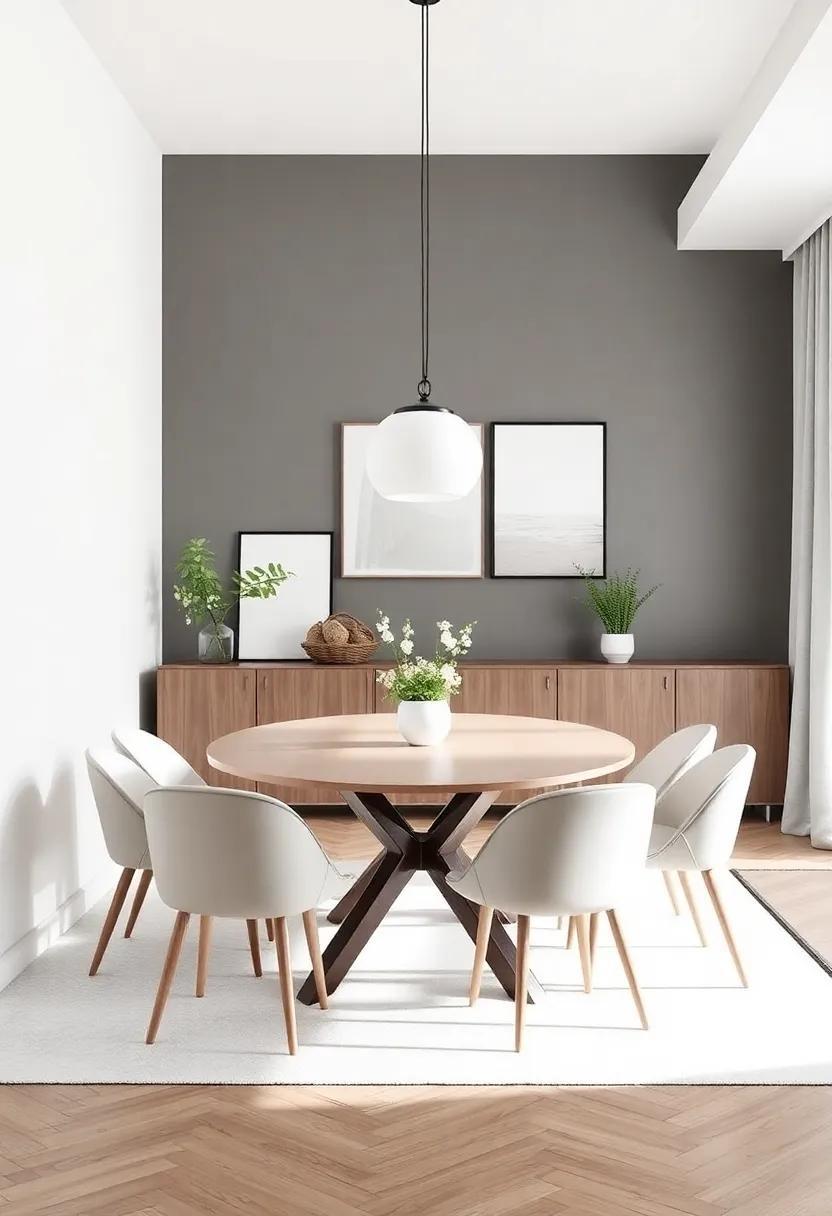
In a world that frequently enough celebrates excess and complexity, the allure of simplicity stands as a refreshing counterpoint. The minimalist aesthetic, with its clean lines and uncluttered spaces, invites us to rethink our surroundings, turning our living environments into sanctuaries of comfort and tranquility. Nowhere is this ideology more beautifully expressed than in the dining room—a place not only for meals but for connection, conversation, and cherished moments with loved ones. In this article, we explore chic minimalist dining room ideas that cater perfectly to cozy spaces. Whether you reside in a petite apartment or a snug home, these thoughtfully curated concepts will inspire you to embrace the beauty of minimalism, making every meal a festivity of simplicity and style. Let’s delve into the transformative power of a minimalist dining room and discover how to create an atmosphere that feels both inviting and effortlessly chic.
Embracing Minimalism: The Allure of Clean Lines in Dining Designs
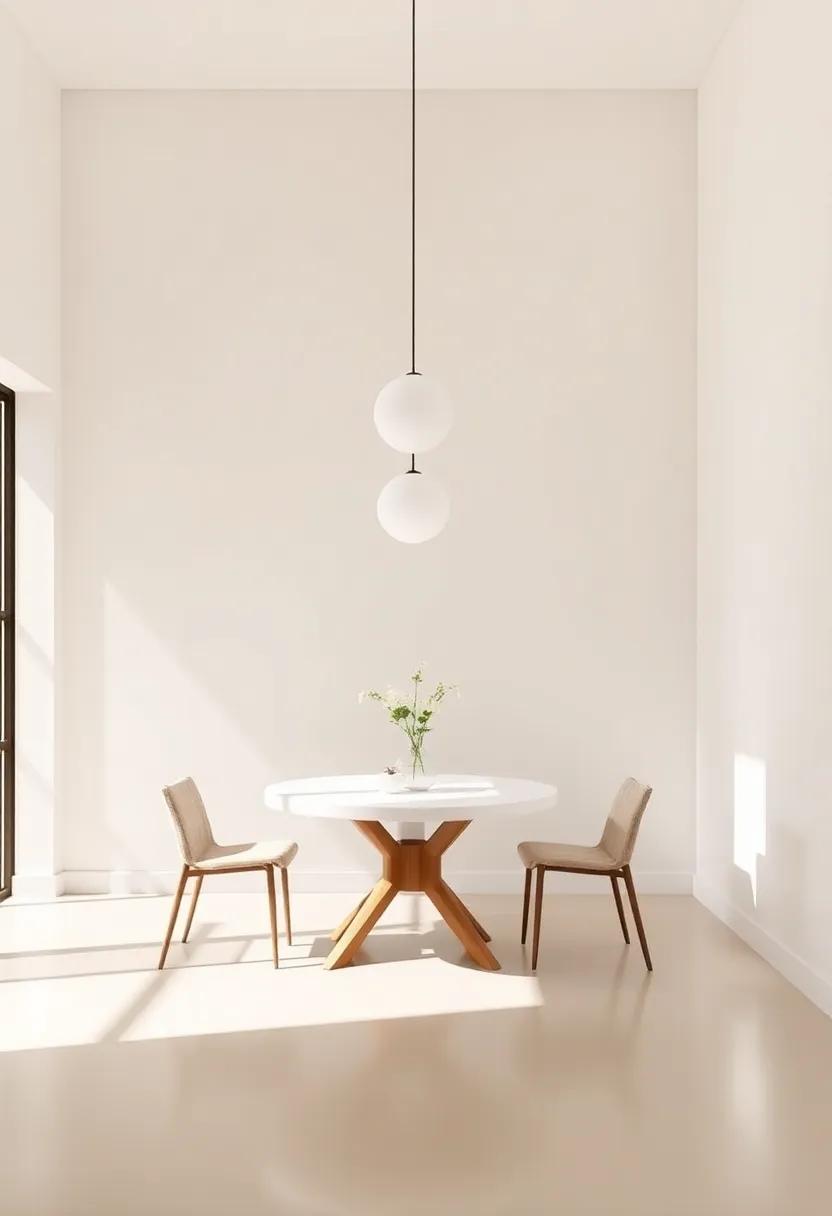
In the world of interior design, less truly can be more. The beauty of minimalist dining spaces lies in their ability to promote a sense of peace, clarity, and functionality. Clean lines and uncluttered surfaces invite the eye to explore the subtleties of form and texture, transforming dining areas into tranquil havens. Consider incorporating elements such as:
- Natural materials: Wood, stone, and metal create a harmonious blend of texture.
- Neutral color palettes: Soft whites, grays, and earth tones provide a calming backdrop.
- Sleek furniture: Simple, geometric shapes enhance the elegance of minimalist design.
Furniture placement in these spaces should also focus on functionality and flow, ensuring every piece serves a purpose without overwhelming the area. A well-chosen dining table can act as the centerpiece, setting the tone for the room. Look for designs with:
- Round shapes: Encourage conversation and intimacy among guests.
- Extendable features: Offer versatility for larger gatherings while maintaining simplicity.
- Clear or translucent materials: Create an illusion of space and lightness.
| Element | effect |
|---|---|
| light Colors | Enhance brightness and openness |
| Open Shelving | showcase curated items without clutter |
| Statement Pieces | Add character without overwhelming |
A Palette of Tranquility: Choosing Soft Neutrals for Cozy dining Rooms
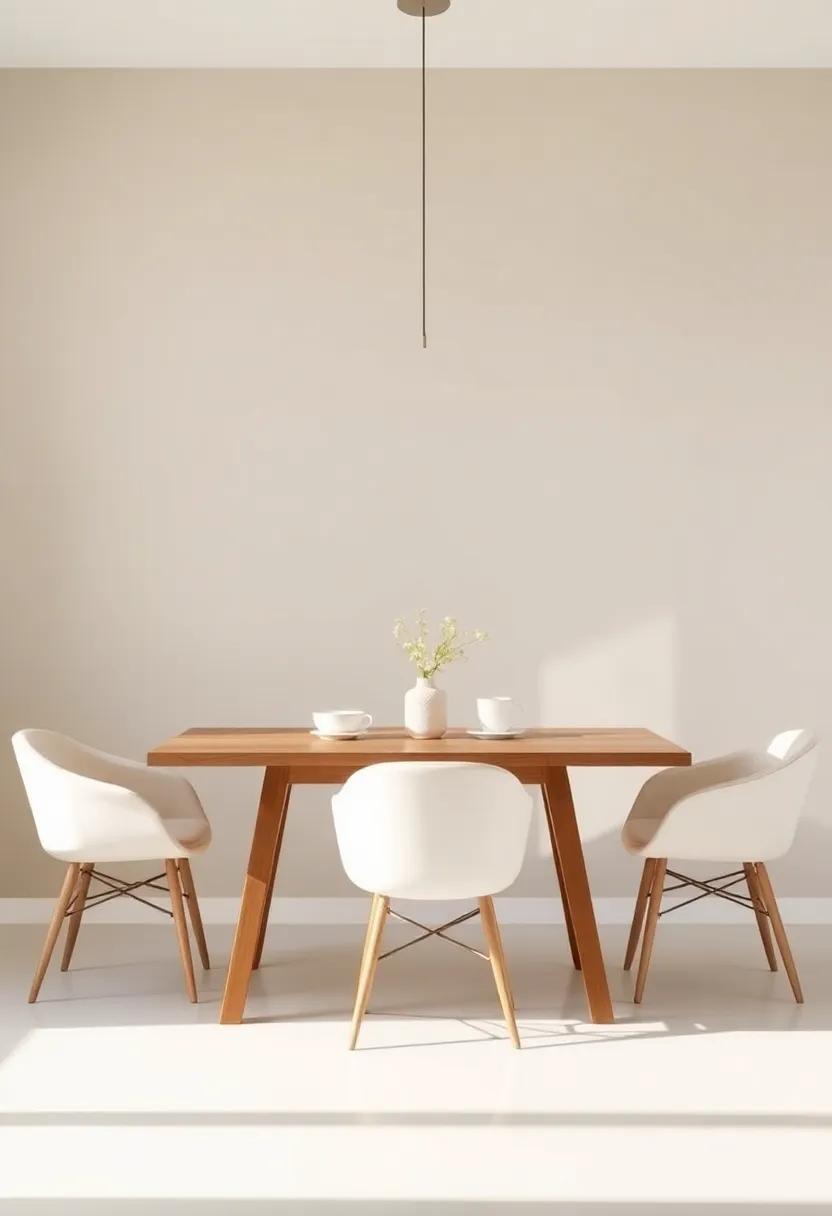
For a serene dining experience that promotes relaxation and comfort, consider painting your walls and selecting furniture in a range of soft neutrals. Colors such as light beige, soft gray, and creamy white act as a gentle backdrop, allowing the space to breathe while providing a warm ambiance. you can elevate the coziness by incorporating natural materials like a wooden dining table or wicker chairs, which harmonize beautifully with your chosen palette. A few elegant accent pieces, such as throw pillows in muted tones or a textured table runner, can enhance the overall feel without overwhelming the senses.
To bring your vision to life, consider these elements that work seamlessly with soft neutrals to create an inviting dining area:
- Layered Textures: Combine fabrics like linen, cotton, and jute for a welcoming touch.
- Natural Light: Maximize daylight with sheer curtains or strategically placed mirrors.
- Soft Lighting: Opt for pendant fixtures or candles that cast a warm glow during mealtime.
| Neutral Shade | Recommended Texture | Color Pairing |
|---|---|---|
| Light Beige | Canvas Tablecloth | Soft Green Accents |
| Cool Gray | Knitted Throw | Dusty Rose Accents |
| Creamy White | Wooden Elements | Sky Blue Accents |
Natural Elements: Infusing Your Space with Organic Textures and Materials
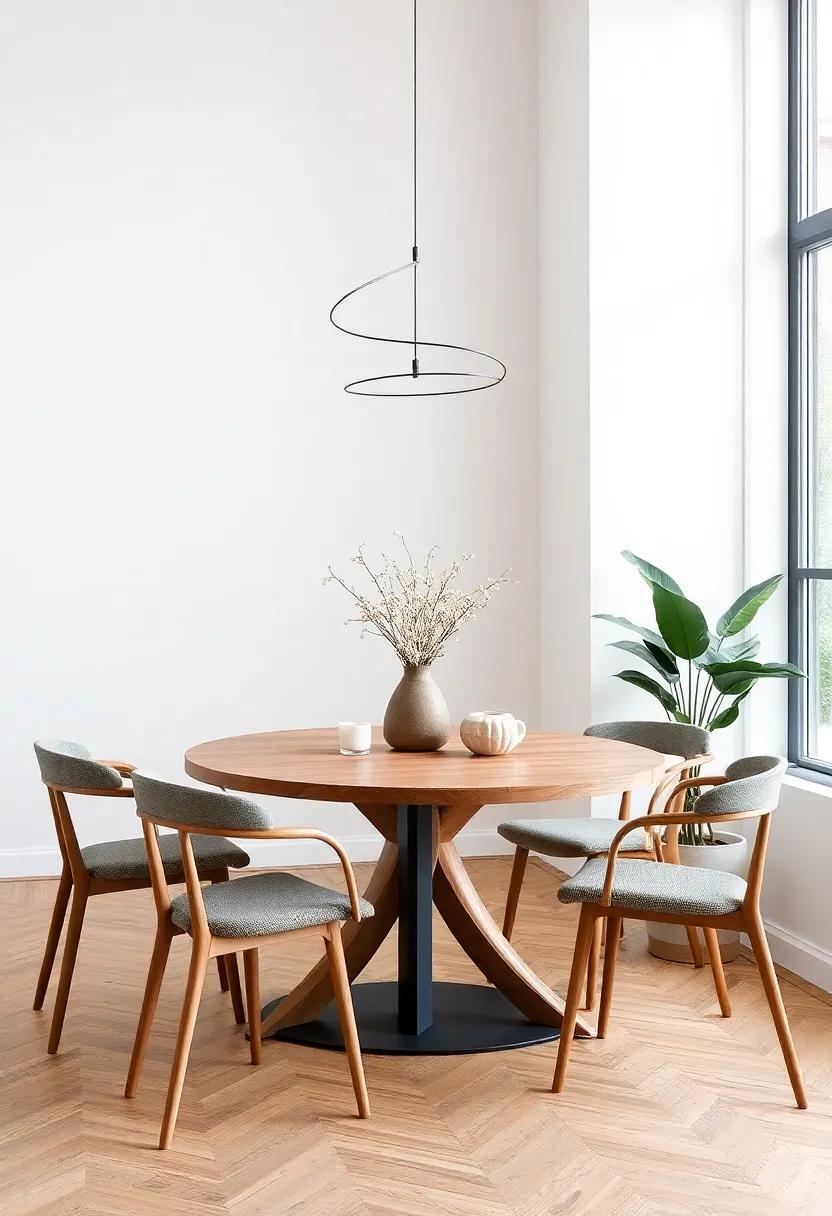
Incorporating natural elements into your dining room brings a refreshing sense of tranquility and warmth. Consider using wooden furniture with a natural finish, which adds both style and an earthy touch. Complement these pieces with woven textiles, like table runners or placemats made from organic fibers, enhancing the tactile experience. Plants can also play a critically importent role; select low-maintenance greenery such as succulents or ferns that suit your space and resonate with the minimalist aesthetic.Moreover,a jute rug can add an organic layer underneath your dining table,offering textural contrast while adhering to a clean design ethos.
To further elevate your dining area, explore the use of ceramic or terracotta tableware that embodies handcrafted charm.These materials, celebrated for their natural variations, can create an inviting table setting that feels both casual and chic. For lighting, consider fixtures made from bamboo or rattan, which cast warm shadows and enhance the organic feel of the room. When it comes to color palettes, opt for earthy tones like soft greens, browns, and creams to establish a soothing ambiance, tying together your minimalist vision with the inherent beauty of nature.
Streamlined Furniture: Essential Pieces for a chic Minimalist Dining Room
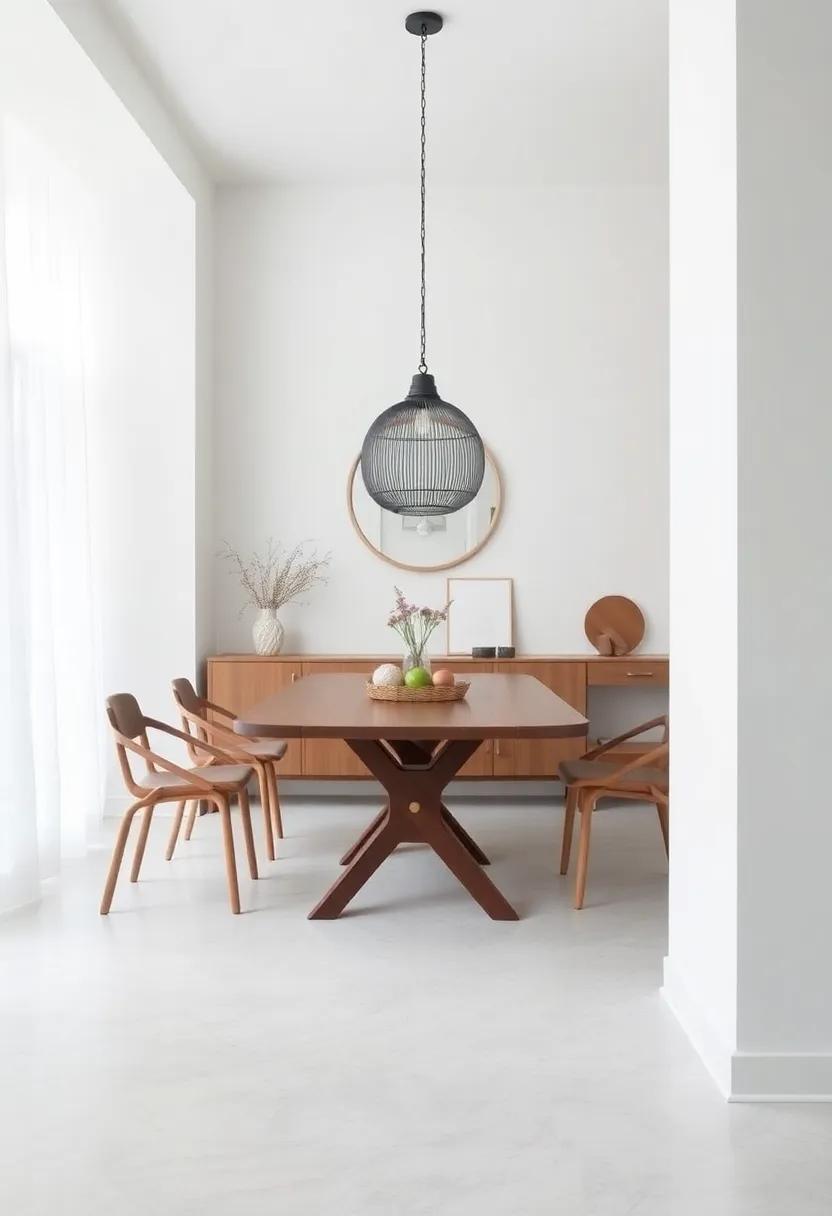
When it comes to curating a minimalist dining room, furniture selection plays a vital role in achieving that chic aesthetic. Start with a simple dining table, preferably in light wood or a clean white finish, which not only provides a focal point but also amplifies the space. Pair it with sleek chairs that possess subtle elegance—think bent plywood or polypropylene designs that are not only sculptural but also offer comfort without the visual clutter. Avoid anything too ornate; rather, choose pieces that have clear lines and an organic feel.A sideboard or console, equipped with integrated storage, can further enhance functionality while maintaining a streamlined look.
Add personality through your accessories but keep them minimal. Opt for a small centerpiece, such as a single vase with fresh flowers or a succulent, to inject a hint of color without overwhelming the senses. You might also consider incorporating ambient lighting with a pendant lamp or wall sconces—ideally in a matte finish that complements your furniture choices. To ensure everything harmonizes, utilize a cohesive color palette, perhaps incorporating soft neutrals paired with one or two accent shades drawn from nature. This careful curation invites a sense of tranquility and sophistication into your dining space.
Cohesive Decor: harmonizing Your Dining Room with Thoughtful Accessories
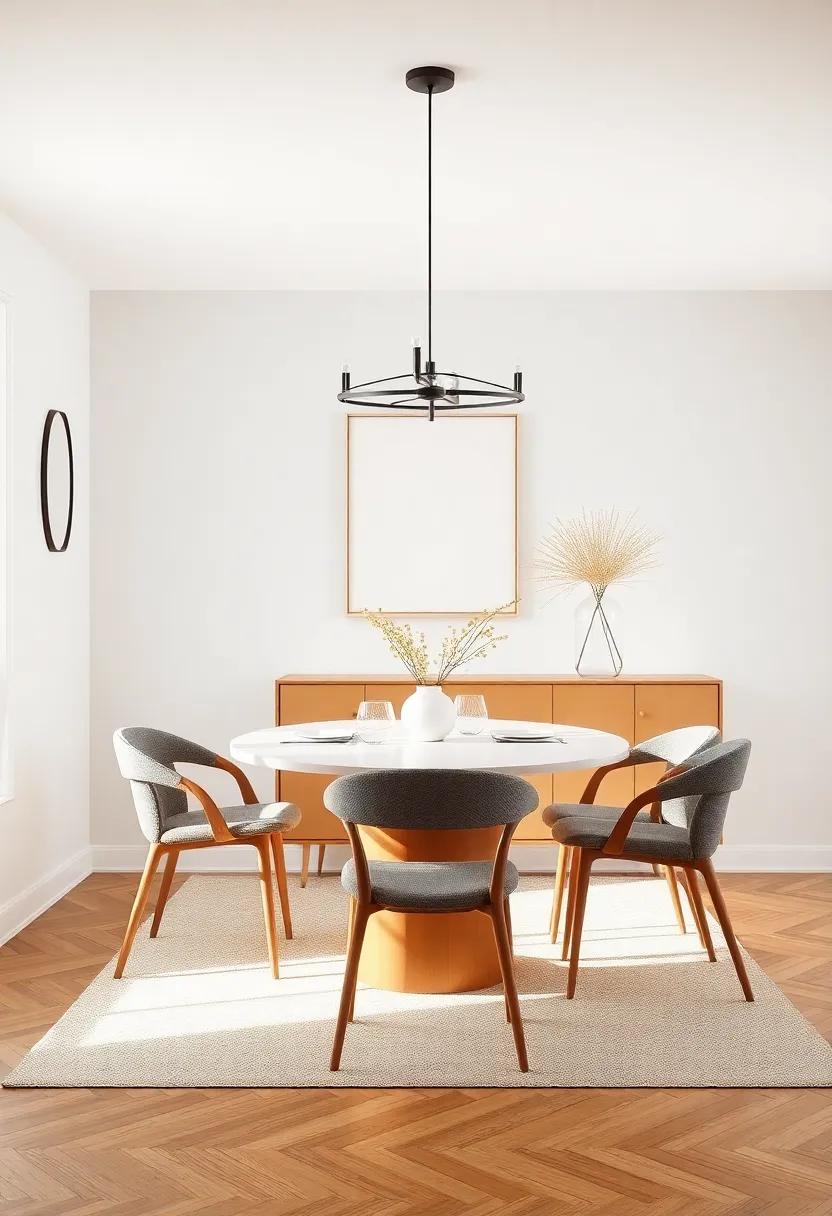
Creating a harmonious atmosphere in your dining room doesn’t require an extensive renovation; often, it’s the little details that can elevate a minimalist space into one that feels more inviting and cohesive. Start by selecting a color palette that promotes tranquility and complements your existing furniture. Consider incorporating accessories that blend seamlessly with this palette, such as elegant dishware or matching textiles. Textures, too, play a crucial role—soft linens, natural wood, and cool metal accents can all coexist beautifully. Enhance your dining experience with thoughtfully placed items like a simple, modern vase filled with seasonal blooms or a handcrafted centerpiece that doubles as a conversation starter.
Don’t underestimate the power of lighting to unify your dining room’s look. A stylish pendant lamp or strategically placed candles can add warmth and depth to the space. Organize your accessories to avoid clutter; opt for a few statement pieces rather than numerous small items. Here are some key accessories to consider:
- Table runners: Add subtle patterns or textures without overwhelming the senses.
- Artistic placemats: Use materials like cork or bamboo for an eco-friendly touch.
- Bold wall art: Choose one large piece that ties your color scheme together.
To illustrate your accessory choices, a simple table can definitely help clarify the types of items you might want to consider:
| Accessory Type | Purpose | Styling Tip |
|---|---|---|
| Centerpiece | Focal point for the table | Keep it low for easy conversation |
| Candles | Ambient lighting | Mix heights for visual interest |
| Textiles | Softens the table setting | Coordinate with color palette |
Light and Airy: The Impact of Natural Light in minimalist Dining Spaces
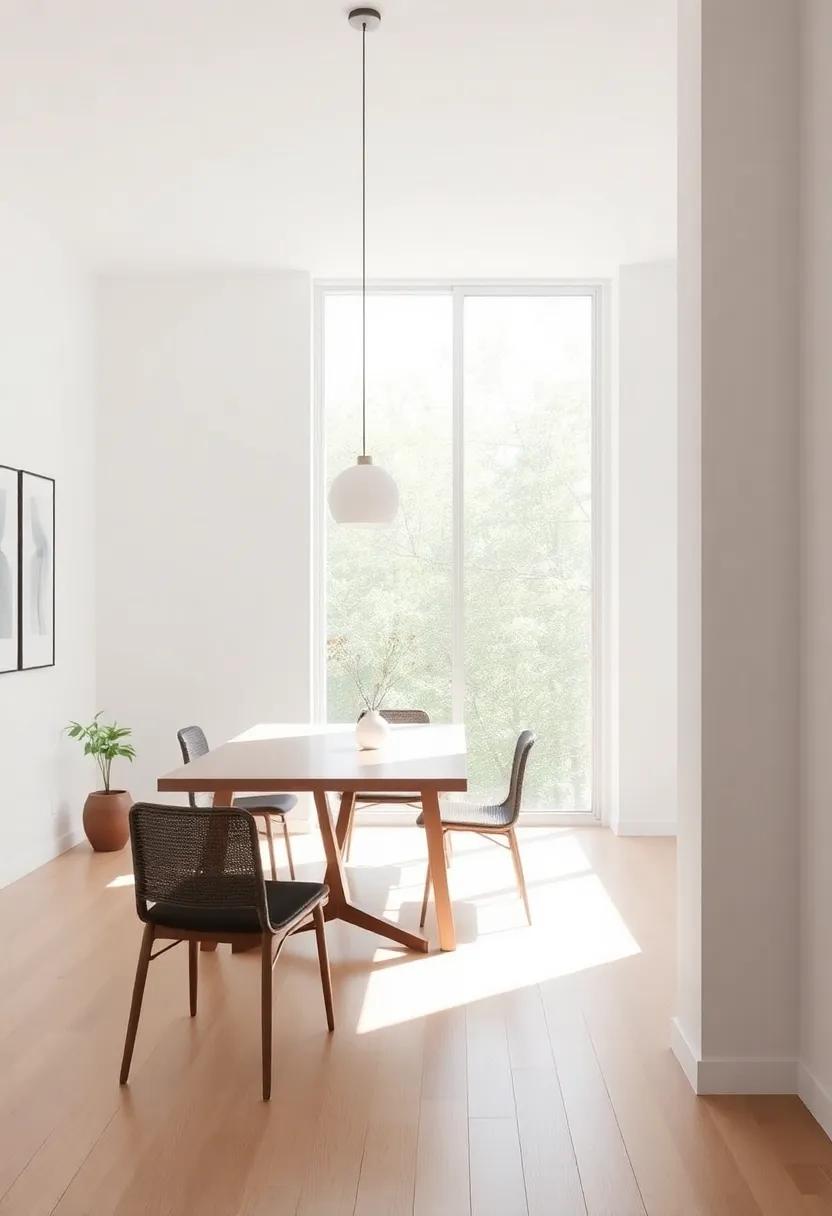
Natural light can transform a dining area into a peaceful retreat, amplifying the simplicity of minimalist design. Incorporating large windows or glass doors facilitates an abundance of daylight, creating an open and airy surroundings that promotes relaxation and conversation. For those looking to maximize light, consider using light-colored palettes, such as soft whites, pale grays, and gentle hues of beige. These shades reflect sunlight,making the room feel even more spacious and inviting. Additionally, minimalistic furnishings with sleek lines can definitely help maintain the uncluttered aesthetic, allowing the natural light to take centre stage.
Enhancing the connection between indoor and outdoor spaces can further amplify the serene atmosphere. Implementing features such as indoor plants,strategically placed mirrors,or even a well-placed table can reflect light and create depth.To complement this harmony, consider a few key elements:
- Translucent Fabrics: Use sheer curtains that allow sunlight to filter through while maintaining privacy.
- Neutral Accents: Choose decor items that harmonize with your color scheme to keep distractions at bay.
- Natural Materials: Incorporate wood, stone, or ceramic elements to infuse warmth without compromising simplicity.
For enhanced organization and functionality, a minimalist dining space can include a small table that maximizes utility while remaining stylish. An example of effective space utilization could be a round dining table surrounded by minimalistic, stackable chairs, allowing for easy movement and flexibility. Here’s a speedy overview of ideal furniture choices:
| Furniture Type | Ideal Material | Benefits |
|---|---|---|
| Dining Table | Light Wood | Brings warmth while keeping the space airy. |
| Chairs | metal or Acrylic | Offers a modern touch without overwhelming visual space. |
| Lighting | Simple Pendant Light | Enhances ambiance without cluttering the aesthetic. |
Smart Storage Solutions: Maximizing Space in Compact Dining Areas
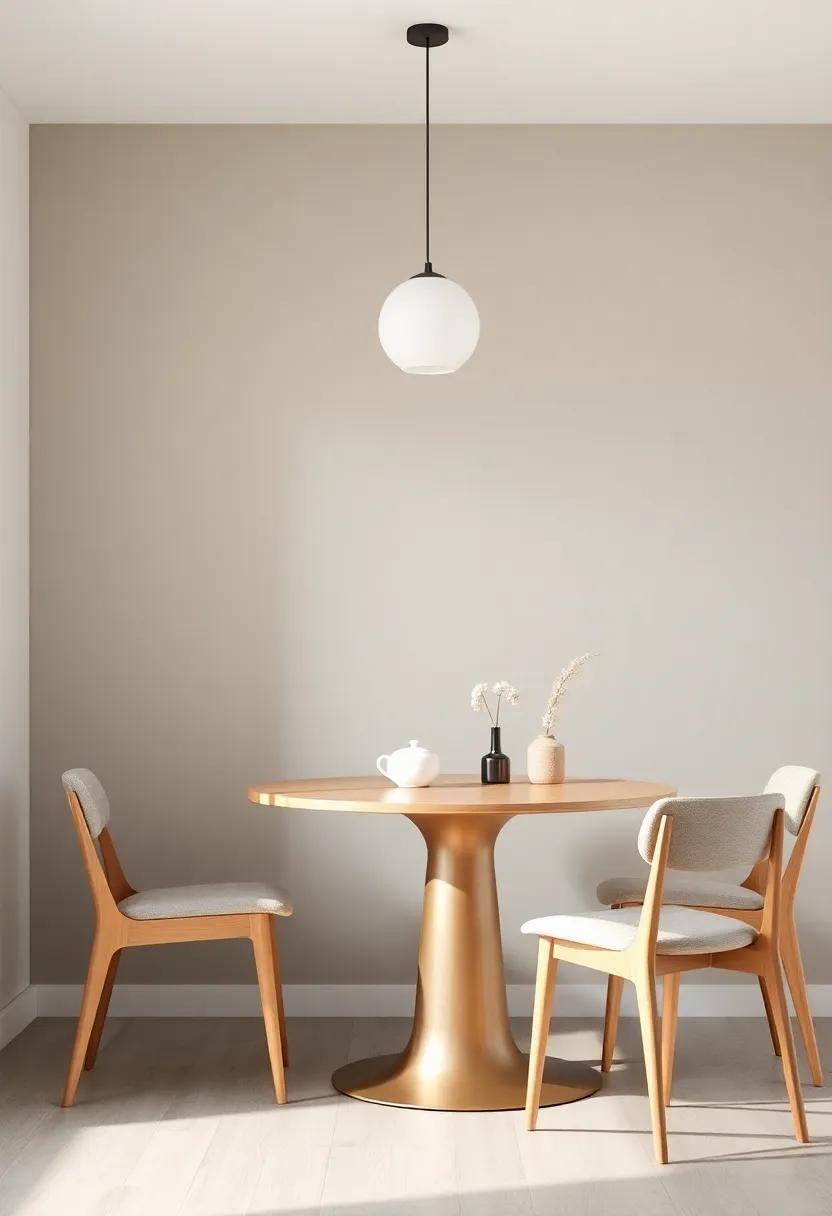
In compact dining areas, storage solutions should combine functionality with aesthetics. A sleek, extension table can be a game changer, accommodating guests during dinner parties while conveniently folding away when not in use.Opt for chairs that can nest beneath the table or that double as storage units. Consider wall-mounted shelves to showcase decorative items or dishes, effectively using vertical space while keeping the floor area unobstructed. Bench seating with hidden compartments can provide additional seating and also storage for items like placemats and cutlery, allowing for a clean and organized dining experience.
Utilizing multi-functional furniture is key in small spaces. Look for, for example, ottomans with storage that can serve as footrests or extra seating. Rolling carts can function as mobile storage or serving stations that can be tucked away when not in use.To help visualize these storage ideas, consider the following table:
| Furniture type | Functionality |
|---|---|
| Extension Table | space-saving for gatherings |
| Storage Benches | Seating and hidden storage |
| Wall-mounted Shelves | vertical storage and decor |
| Rolling Carts | Mobile serving and storage |
| Ottomans | Additional seating with storage |
Focal Points: Creating a Stunning Centerpiece in a Simple dining Room
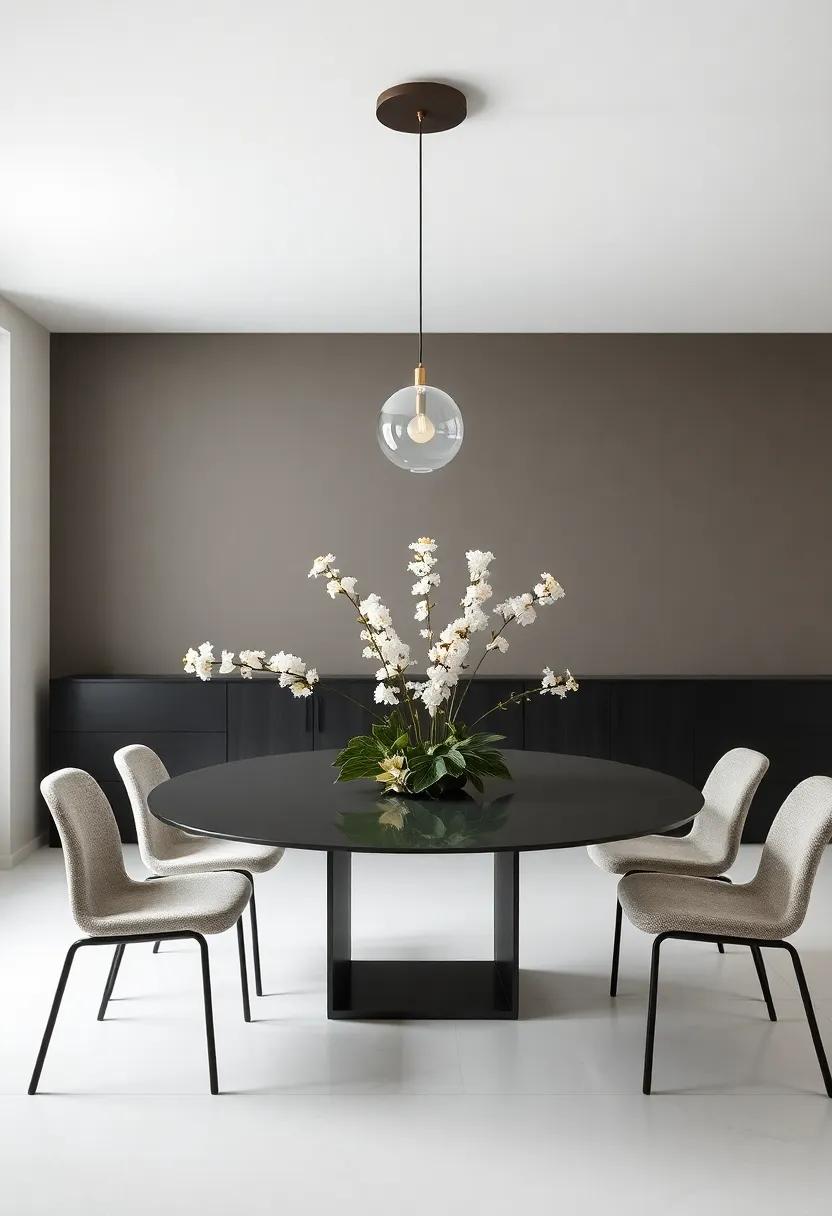
In a minimalist dining room, the key to creating a stunning centerpiece lies in the art of simplicity. Choose a statement piece,such as an oversized vase or an artistic sculpture,that draws the eye without overwhelming the space. The color palette should remain muted; think soft whites, natural wood tones, or gentle grays. To enhance the elegance, consider using fresh flowers or a few carefully selected fruits in your centerpiece. This not only adds a pop of color but also brings a touch of nature indoors, creating a warm and inviting atmosphere.
For added depth and interest,layer your centerpiece with textural elements. Incorporate various materials like metallic candle holders, glass accents, or textured textiles to break the monotony and create visual intrigue. Consider organizing your table settings around the centerpiece to maintain a cohesive look. Use patterned plates, minimalist cutlery, and understated linens to complement your focal point without competing with it. Below is a simple table that outlines some centerpiece ideas and their corresponding effects:
| Centerpiece Idea | Effect |
|---|---|
| Oversized Vase with Fresh Flowers | Brings vibrancy and a natural feel |
| Sculptural object | Adds a modern and artistic touch |
| Candle arrangement | Creates a cozy and intimate ambiance |
| Textured table Runner | Introduces warmth and comfort |
Mood Lighting: The Role of Ambient illumination in Cozy dining Atmosphere
creating a cozy dining atmosphere is an art, and ambient illumination plays a pivotal role in setting the scene. Soft, warm hues can transform a simple space into an inviting retreat, allowing diners to feel relaxed and at home. Consider incorporating various lighting elements such as pendant lights, wall sconces, and candles to enhance the overall aesthetic. Here are some effective ideas for achieving that soothing glow:
- Dimmer Switches: Control the brightness according to mood and time of day.
- Layered Lighting: Combine overhead,task,and accent lights for depth and interest.
- Table Centerpieces: Use candles or lanterns as focal points that provide soft illumination.
The choice of lighting fixtures also contributes to the minimalist design, offering both style and function without overwhelming the senses. A simple color palette with light fixtures in muted tones will harmonize with the minimalist theme while still creating an inviting glow. Here is a quick reference for some popular ambient lighting options:
| Lighting Option | Effect | Best For |
|---|---|---|
| Soft LED Bulbs | Warm and Inviting | General Use |
| Candlelight | Intimate and Romantic | Special Occasions |
| Fairy Lights | Whimsical Charm | Casual Gatherings |
Layered Textiles: Softening Your Space with Minimalist Fabrics and Patterns
Layering textiles in your dining room can transform the atmosphere into a serene and welcoming haven. Utilizing minimalist fabrics not only adds texture but also creates an elegant backdrop for your dining experiences. Consider incorporating a soft linen tablecloth that gracefully drapes over your table, paired with cotton napkins in muted tones. Add subtle interest with patterned placemats—think simple geometric shapes or understated stripes. These elements can work together harmoniously to enhance the cozy, minimalist aesthetic while keeping your decor effortlessly stylish.
To further enrich the visual appeal, play with a mix of textures and tones. Throw pillows can introduce layers of comfort on dining chairs, inviting guests to linger a little longer. Opt for materials like velvet or brushed cotton in a monochromatic palette, carefully selecting varying shades to create depth.You might also consider open shelving adorned with neatly arranged textiles—such as lightweight throws or elegantly folded blankets—offering both functionality and a curated look. here’s a quick reference of items that can elevate your space:
| Textile Element | Purpose |
|---|---|
| Tablecloth | Adds softness and warmth |
| Napkins | Enhances table setting |
| Placemats | Defines space and protects surfaces |
| Pillows | Offers comfort and style |
| Throws | Invites coziness and layered textures |
Open Layouts: Designing Fluid Spaces for a Seamless Dining Experience
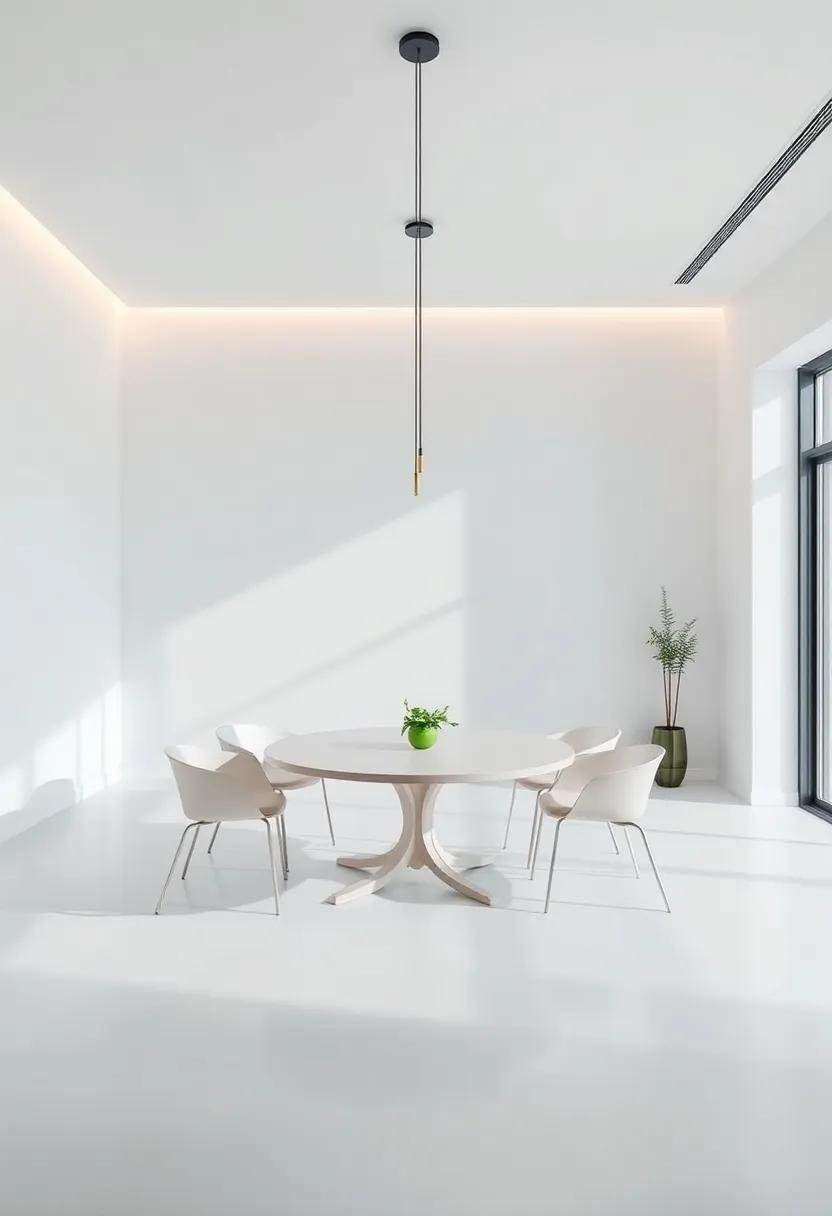
In the realm of interior design, the beauty of open layouts lies in their ability to create a harmonious flow throughout a space. By eliminating unnecessary walls and barriers, dining areas become more than just places to eat; they transform into inviting hubs of connection and relaxation. To achieve this seamless experience, consider incorporating elements such as:
- Cohesive Color Palettes: Utilize soft, neutral tones that visually tie the dining area to adjoining spaces.
- Multi-Functional Furniture: Choose pieces that serve double duty, like a dining table that can expand for gatherings.
- Strategic Lighting: Layer ambient, task, and accent lighting to create warmth and intimacy.
Additionally, integrating natural elements can substantially enhance the feeling of fluidity. Open spaces benefit greatly from a touch of nature, so consider these suggestions for bringing the outdoors in:
| Element | Impact |
|---|---|
| Indoor Plants | Adds life and improves air quality. |
| Large Windows | Increases natural light and creates visual connections to nature. |
| Natural Materials | Brings texture and warmth,enhancing tactile experiences. |
Personal Touches: Adding Character to Minimalist Dining Rooms Without Clutter
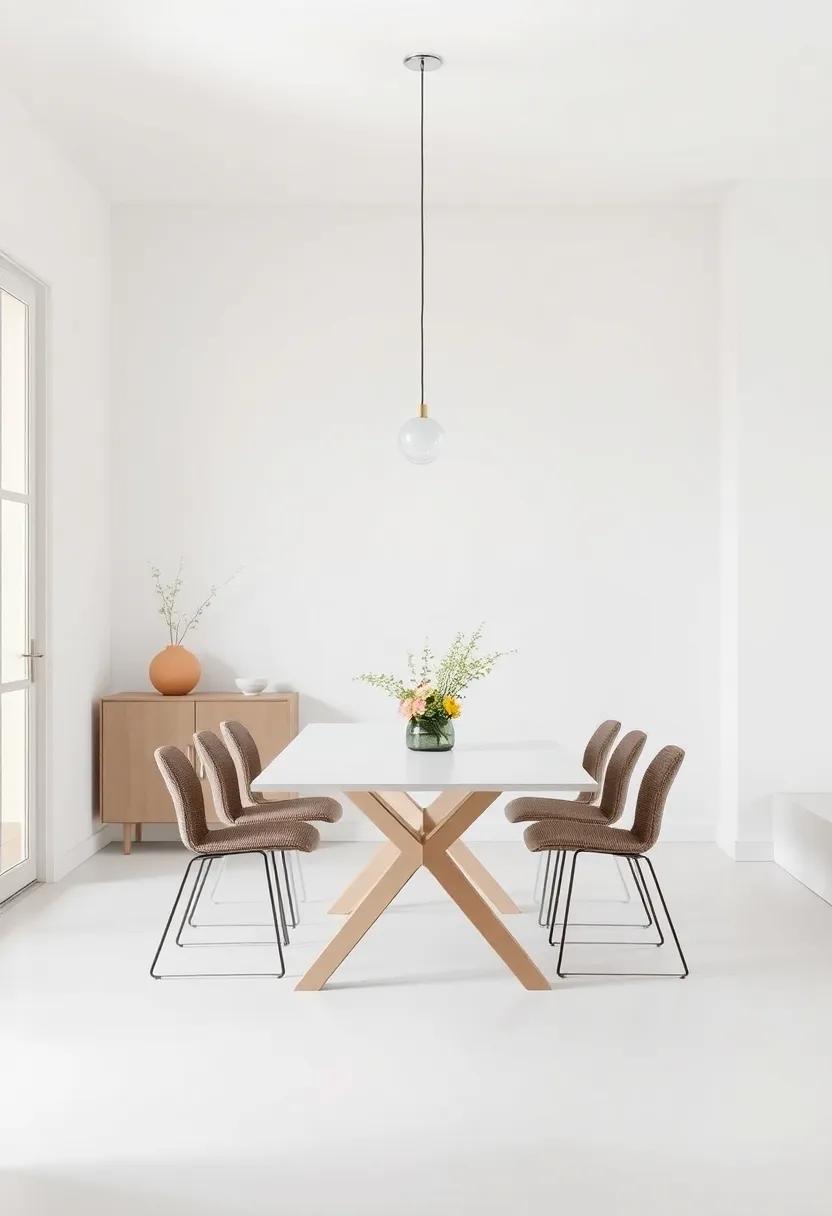
In a minimalist dining room, it’s essential to strike a balance between simplicity and personality. Infusing personal touches can transform your space without overwhelming it. Consider incorporating a unique centerpiece, such as a striking vase filled with seasonal flowers, or a handcrafted bowl that reflects your personal style. These items not only serve as functional décor but also act as conversation starters, allowing your guests to feel the warmth of your aesthetic. Select artwork or photographs that resonate with you, placing them selectively on a single wall to draw the eye upward and maintain the uncluttered feel.
When combining function and flair, focus on texture and material to add depth. Use natural textures through wooden tableware or ceramic dishes that can easily blend with a minimalist palette. Consider a stylish yet simple table runner made of linen for soft contrast without added bulk. Additionally, integrate subtle lighting options like pendant lights or candles that add ambiance while enhancing your dining experience. By thoughtfully curating these elements, you can embrace a design ethos that celebrates both simplicity and individuality, making every meal feel special.
Artisan Touches: Incorporating Unique Handmade Decor for Authenticity
Incorporating unique handmade decor can transform a minimalist dining room into a space that tells a story while maintaining its serene vibe. Look for pieces that resonate with your personal style, such as handcrafted ceramics, woven textiles, or locally sourced wooden centerpieces. These artisan touches not only add character but also create a warm and welcoming atmosphere, inviting guests to linger over meals in a setting that’s both functional and aesthetically pleasing.
When selecting handmade items, consider the following options to enhance your cozy dining area:
- Pottery: Unique vases or bowls that bring a pop of color and texture.
- Textiles: Hand-stitched table runners or cushions that provide comfort and charm.
- Wall Art: Local artists’ landscapes or abstract pieces that spark conversation.
For a more structured look, a simple table can help keep the focus on your artisan decor:
| Item | Source | Functionality |
|---|---|---|
| Handmade Bowl | Local Artisan | Fruit display |
| Woven Table Runner | Craft Fair | Layering texture |
| Framed Artwork | Gallery | Provide focal point |
Sustainable Choices: Eco-Friendly Dining Room Materials for Modern Living
Creating a dining room that is both stylish and sustainable is not only a reflection of modern living but also a commitment to the environment. Consider using bamboo for furniture pieces—this rapidly renewable resource is strong, versatile, and adds a warm aesthetic to any space. Reclaimed wood is another excellent option,offering unique character while reducing the demand for new lumber. Pair these materials with furnishings made from recycled metals or organic textiles for an eco-friendly design that doesn’t sacrifice style. Additionally, prioritize low-VOC finishes to enhance air quality in your dining area.
Incorporate elements that promote sustainability, such as a minimalist table crafted from sustainable materials or seating upholstered with biodegradable fabrics. Use energy-efficient lighting to create ambiance without compromising on eco-friendliness. Consider the following options when designing your space:
- FSC-Certified Wood: Guarantees responsible forest management.
- Glass and Metal: Durable, recyclable, and easy to maintain.
- Natural Fiber Rugs: Such as jute or sisal, add texture while being eco-conscious.
Indoor Plants: breathing Life into Your Dining Room with greenery
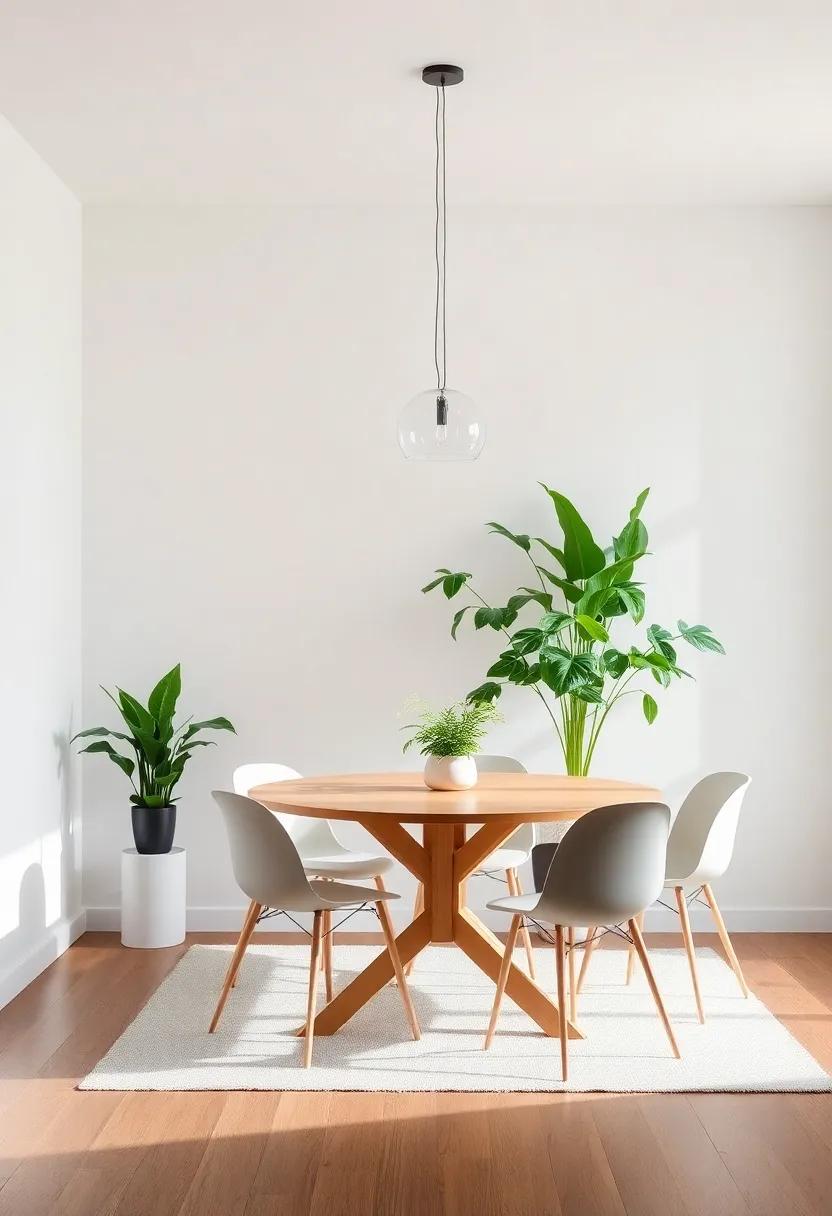
Transforming your dining room into a serene oasis is easier than you think, especially when you incorporate indoor plants. Foliage adds a splash of life and vibrancy to minimalist designs, creating a perfect balance between simplicity and elegance. Consider the snake plant or pothos, which thrive in low light and require minimal care. Pair these with sleek, modern pots that complement your overall decor—perhaps a matte white ceramic or a chic concrete finish. This thoughtful integration not only enhances the aesthetic appeal but also promotes a feeling of tranquility, inviting relaxation during meals.
For a more dynamic look, create a layered greenery display using a mix of plant heights. place a taller plant,such as a fiddle leaf fig,in a corner to draw the eye upwards,while scattering smaller succulents around the dining table. You can also utilize hanging planters to maximize space and add dimension, bringing the greenery into the vertical spectrum of your design.To further personalize your dining experience, consider utilizing a plant care schedule, ensuring your greens remain vibrant and healthy. Here’s a simple table to help you keep track:
| Plant Type | Watering Schedule | Light Requirements |
|---|---|---|
| Snake Plant | Every 2-3 weeks | Low to radiant indirect light |
| Pothos | Every week | Low to bright indirect light |
| Fiddle Leaf Fig | Every 1-2 weeks | Bright, indirect light |
| Succulents | Every 2-3 weeks | Direct sunlight |
Thoughtful Arrangements: The Art of Minimalist table Setting
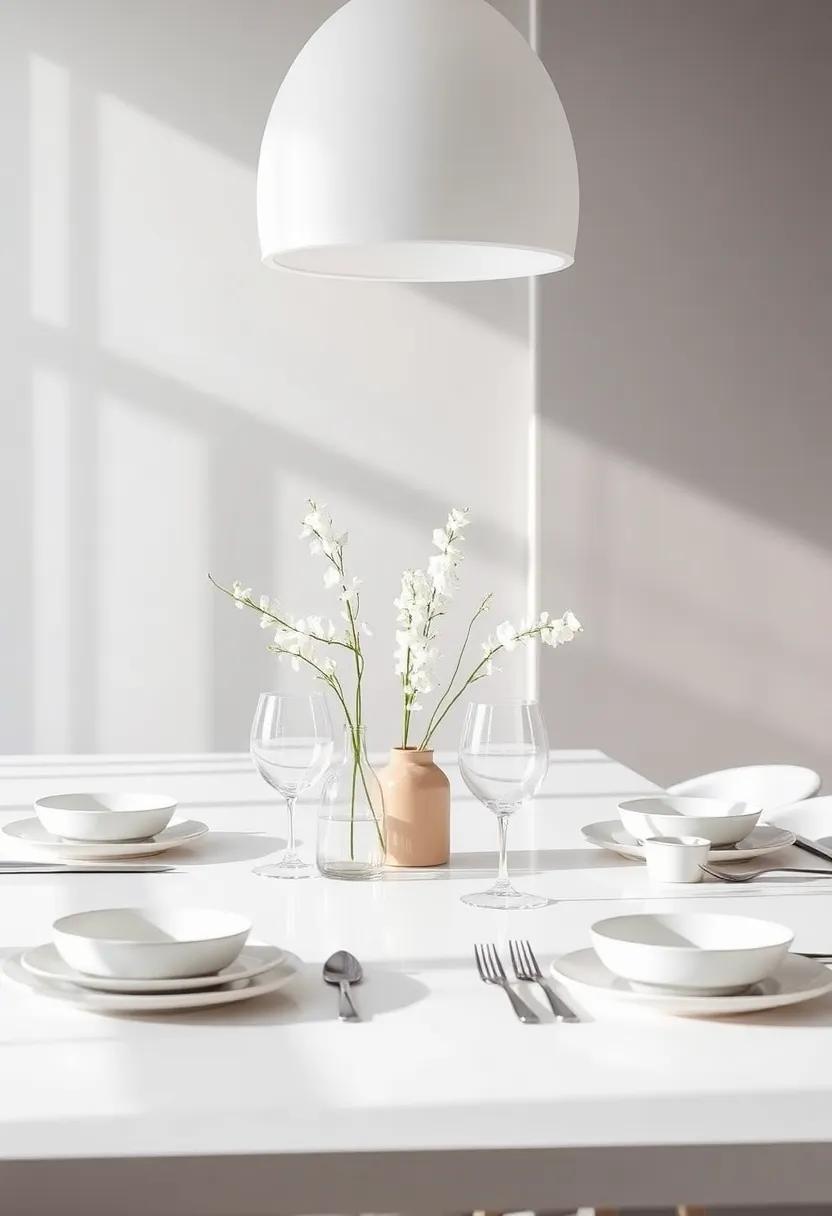
Creating a calm and inviting atmosphere at the dining table can be achieved through thoughtful arrangements that focus on simplicity.A minimalist table setting emphasizes clean lines and functional elegance, allowing the beauty of the space to shine through.Start by selecting a neutral color palette—think whites, greys, and natural wood tones. This not only sets a serene backdrop but also allows decorative elements to pop. Consider the following essentials for your table:
- Simple Tableware: Opt for understated dishes that complement each other.
- Natural Elements: Incorporate items like stone coasters or wooden serving platters.
- Subtle centerpiece: Use a single vase with fresh flowers or a low-profile bowl of fruit.
Embrace negative space by avoiding overcrowding on the table.Maintain a balance that draws the eye through both the center and edges of your settings. Layering textures can add warmth without overwhelming the senses; imagine a crisp linen table runner combined with smooth ceramic dishes. for added functionality, consider a sleek side table to hold drinks and snacks, ensuring that the dining area remains clutter-free. Here’s a simple layout for reference:
| element | Purpose |
|---|---|
| Neutral Tablecloth | Enhances the minimalist aesthetic |
| Uniform Cutlery | Promotes a cohesive design |
| Clear Glassware | Adds elegance without distraction |
Contrast and Complement: balancing Dark and Light Elements for Visual Interest
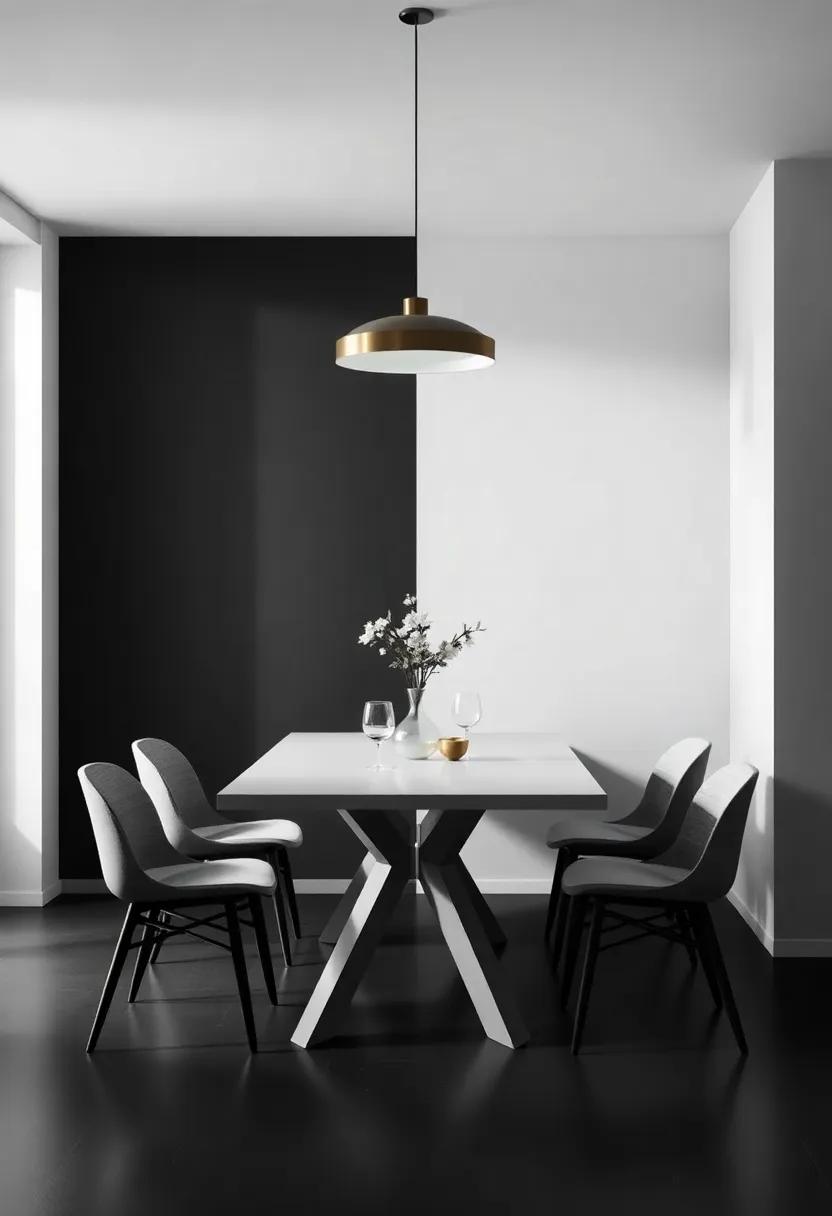
Creating a visually appealing dining room requires a careful dance between dark and light elements, each playing a vital role in establishing a cozy ambiance. Dark wood furniture, when paired with lighter fabrics and accessories, offers a refined contrast that draws the eye and emphasizes the elegance of your space. Consider incorporating:
- Charcoal gray table with white or pale linen table settings
- deep navy dining chairs against ivory walls
- Black metal light fixtures juxtaposed with soft beige curtains
This interplay not only enhances depth but also guides the viewer’s focus, ensuring that no single element overwhelms the senses. Conversely, accentuating lighter elements in a room filled with dark pieces can also yield stunning results. Play with texture by introducing airy materials or finishes such as:
- Translucent glass vases or dishware
- Soft,fluffy rugs to counterbalance sleek dining furniture
- Bright artwork hanging over dark surfaces
Seasonal Decor: Adapting to Change While Keeping a Simple Aesthetic
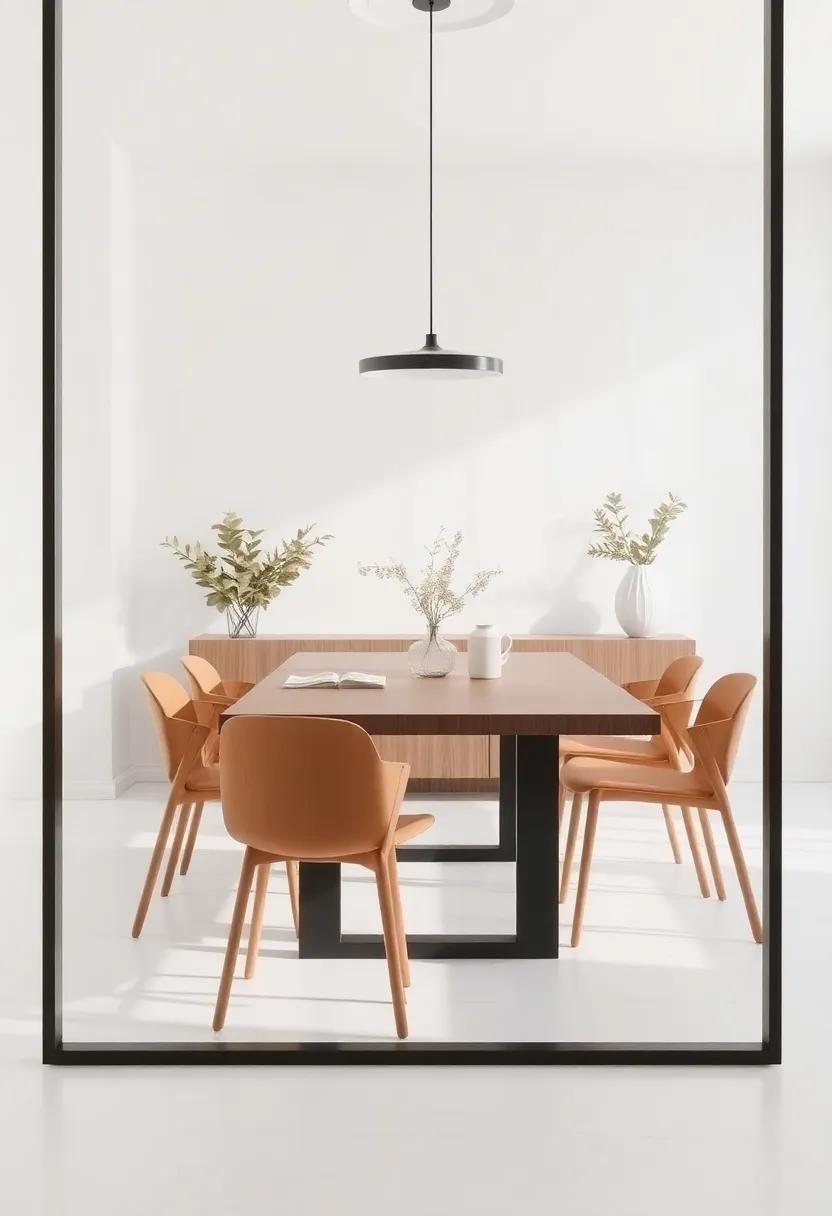
As the seasons shift, so do our desires for a fresh yet uncomplicated aesthetic in our living spaces.To create a cozy dining room that feels both inviting and serene,consider introducing subtle seasonal elements that don’t overwhelm. A few carefully chosen accents can bring warmth and character without sacrificing simplicity. Natural textures like soft cotton tablecloths or linen napkins, alongside minimalist tableware, can transform the dining experience while maintaining a clean look. Simple centerpieces such as a few sprigs of seasonal foliage or muted metallic candle holders enhance the space’s charm without clutter.
To effectively achieve a balance between seasonal change and a minimalist approach,focus on a harmonious palette that shifts slightly with each season. Consider using a color scheme inspired by nature,such as earth tones for autumn or light pastels for spring. Some key elements to consider include:
- Elegant glass vases filled with fresh blooms or dried branches
- Soft, layered textiles in muted hues for the dining chairs
- Artful wall decor that reflects seasonal themes while staying true to minimalist principles
To showcase these ideas, here’s a quick overview of seasonal decor choices:
| Season | Decor Suggestions |
|---|---|
| spring | fresh flowers, light fabrics, pastel accents |
| Summer | Bright, airy colors, natural elements |
| Autumn | Warm tones, rustic textures, simple gourds |
| Winter | Cool tones, cozy textiles, minimalistic motifs |
Cohesion with Nature: Merging Indoor Dining with Outdoor Elements
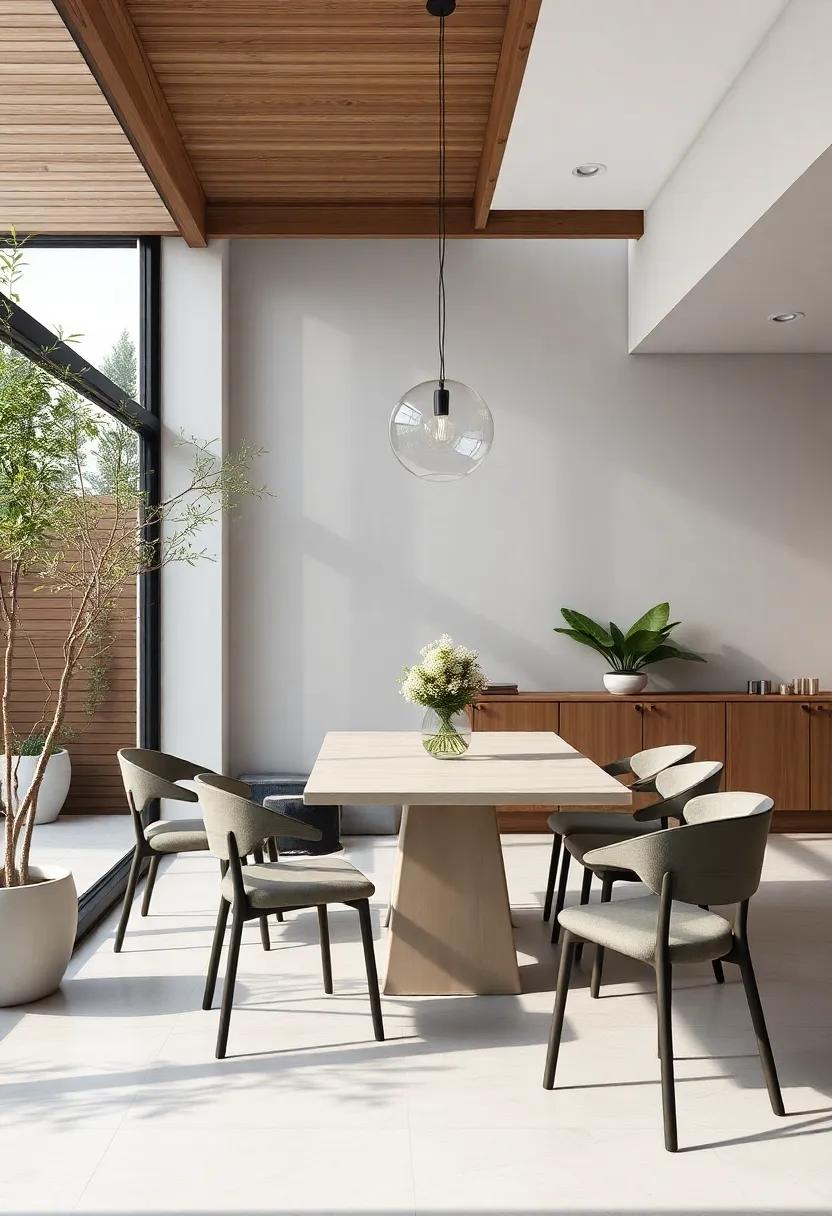
To create an inviting atmosphere that harmoniously blends indoor dining with outdoor elements, consider incorporating natural materials into your decor. Think about using wooden dining tables that showcase the beauty of unique grains, paired with woven chairs for a laid-back, organic feel. Add touches such as plants or succulents on the table, allowing greenery to breathe life into the space.Large windows or sliding glass doors can effectively bring the outdoors in, creating a seamless transition between the comfort of interior settings and the vitality of the outside world.
Another effective way to achieve cohesion is through color palettes drawn from nature. Opt for earthy tones—like soft browns, warm greens, and muted blues—that echo the serenity of natural landscapes. Introducing outdoor-inspired decor, such as lightweight cotton table linens in subtle patterns or organic motifs, can enhance this aesthetic. Artwork featuring serene landscapes or botanical prints can further tie the themes together,enveloping diners in an immersive experience that celebrates simplicity and tranquility.
In Conclusion
As we draw the curtains on our exploration of chic minimalist dining room ideas, it’s clear that simplicity offers a refreshing approach to design, especially in cozy spaces. By embracing a less-is-more philosophy, you can transform your dining area into a serene haven that balances functionality with aesthetic appeal.
Whether you find inspiration in sleek furniture, soft color palettes, or smart organization, remember that minimalism isn’t about deprivation; it’s about celebrating the beauty of simplicity. The right choices can create an inviting atmosphere, allowing you to savor not just meals, but also moments spent with loved ones.
So as you embark on your journey toward a minimalist dining experience, take a moment to breathe, reflect, and appreciate the joy that comes from a thoughtfully curated space. After all, in the world of design, the simplest ideas are often the most profound. Here’s to creating a dining room that perfectly captures your essence—one that is both elegant and effortlessly cozy.



